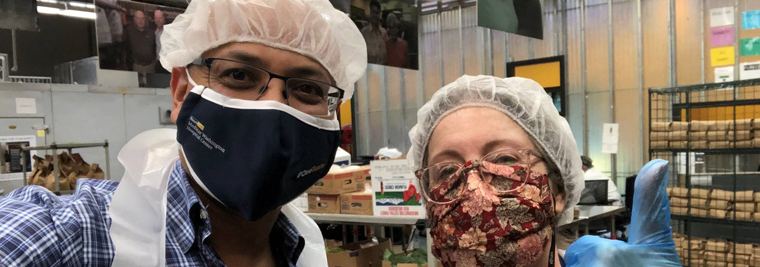Find care now
If you are experiencing a medical emergency, please call 911 or seek care at an emergency room.

Throughout the national health systems, social determinants of health are frequently present which negatively impact health-related outcomes despite excellent medical care. Four of these determinants, namely food insecurity and access to housing, medications and transportation are prevalent in our region as cited by MedStar Health Community Health report. Because of the impact of these social determinates of health, Medstar Health is testing this new initiative. Food and Friends is a community-based NGO which provides nutrition consultation services and 3 medically tailored meals per day for several months to eligible clients with chronic complex medical conditions, including diabetes.
The Department of Emergency Medicine at MedStar Health Washington Hospital Center and the MedStar Health Diabetes Institute are partnering with Food & Friends on a pilot project to identify individuals with diabetes, hyperglycemia, and food insecurity, and link them to medically tailored meal delivery service for 6 months.
Food insecurity is defined as “limited or uncertain availability of nutritionally adequate and safe foods or limited or uncertain ability to acquire acceptable foods in socially acceptable ways.” Of tremendous concern, there are 700,000 people at risk of hunger in Washington, D.C., Those living with diabetes and food insecurity are at particularly high risk of adverse events, in part because of the high cost of medication and the subsequent struggle to decide whether to spend their limited financial resources on food or medication. Screening for food insecurity in patients is an important step towards finding solutions in the community. The MedStar group has described that 46% of hyperglycemic patients presenting to the MedStar Washington Hospital Center Emergency Department with a blood sugar greater than 250 g/dl screened positive for food insecurity, and that these food insecurity patients were 1.9 times more likely to be hospitalized than those without food insecurity. Among the subset with a HgbA1c measured, the mean level was very high at 11.2% and 96% had a HgbA1c > 7.5, which would be considered a reasonable target for many of these persons.
In an emergency department study at MedStar Washington Hospital Center, senior Georgetown University medical students will enroll participants examining the impact of direct food referral for hyperglycemic patients. The study is designed to determine the feasibility, adherence to, and impact of 6 months of no-cost, medically tailored meal delivery among diabetes patients experiencing Food insecurity directly linked from the emergency department..
The study team members are: Munish Goyal, MD, PI, MedStar Emergency Physicians; Michelle Magee, MD, MedStar Health Diabetes Institute; Yumi Jarris, MD; Rebecca Breed, MD; Gavin Koenig; Katie Povey; Donya Enayati; Virginia Chan; Heng Nhoung and Christopher Wagner. In the attached picture, Drs Goyal and Magee are volunteering at Food and Friends to get first-hand experience!














